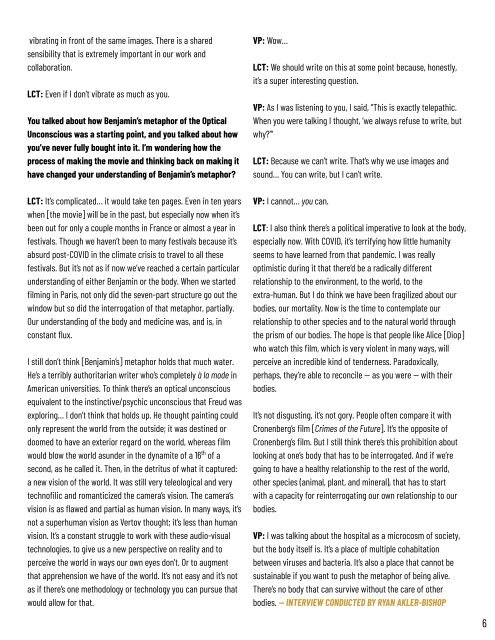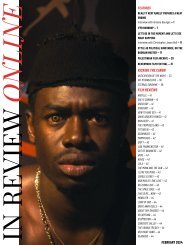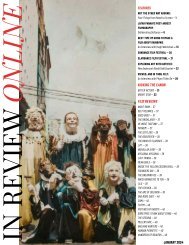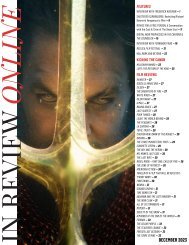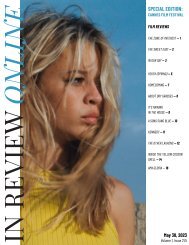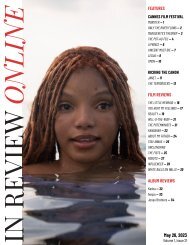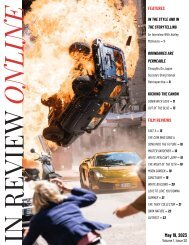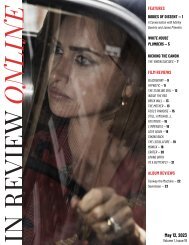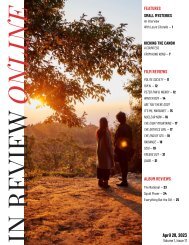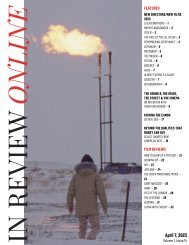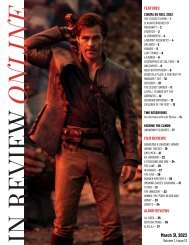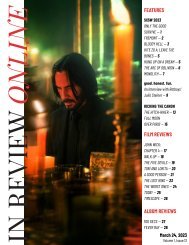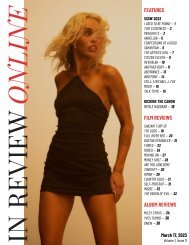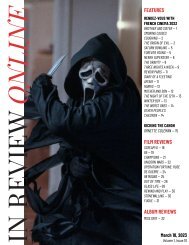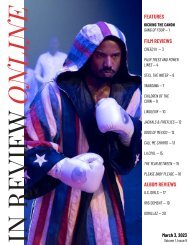InRO Weekly — Volume 1, Issue 16
Create successful ePaper yourself
Turn your PDF publications into a flip-book with our unique Google optimized e-Paper software.
vibrating in front of the same images. There is a shared<br />
sensibility that is extremely important in our work and<br />
collaboration.<br />
LCT: Even if I don’t vibrate as much as you.<br />
You talked about how Benjamin’s metaphor of the Optical<br />
Unconscious was a starting point, and you talked about how<br />
you’ve never fully bought into it. I’m wondering how the<br />
process of making the movie and thinking back on making it<br />
have changed your understanding of Benjamin’s metaphor?<br />
LCT: It’s complicated… it would take ten pages. Even in ten years<br />
when [the movie] will be in the past, but especially now when it’s<br />
been out for only a couple months in France or almost a year in<br />
festivals. Though we haven’t been to many festivals because it’s<br />
absurd post-COVID in the climate crisis to travel to all these<br />
festivals. But it’s not as if now we’ve reached a certain particular<br />
understanding of either Benjamin or the body. When we started<br />
filming in Paris, not only did the seven-part structure go out the<br />
window but so did the interrogation of that metaphor, partially.<br />
Our understanding of the body and medicine was, and is, in<br />
constant flux.<br />
I still don’t think [Benjamin’s] metaphor holds that much water.<br />
He’s a terribly authoritarian writer who’s completely à la mode in<br />
American universities. To think there’s an optical unconscious<br />
equivalent to the instinctive/psychic unconscious that Freud was<br />
exploring… I don’t think that holds up. He thought painting could<br />
only represent the world from the outside; it was destined or<br />
doomed to have an exterior regard on the world, whereas film<br />
would blow the world asunder in the dynamite of a <strong>16</strong> th of a<br />
second, as he called it. Then, in the detritus of what it captured:<br />
a new vision of the world. It was still very teleological and very<br />
technofilic and romanticized the camera’s vision. The camera’s<br />
vision is as flawed and partial as human vision. In many ways, it’s<br />
not a superhuman vision as Vertov thought; it’s less than human<br />
vision. It’s a constant struggle to work with these audio-visual<br />
technologies, to give us a new perspective on reality and to<br />
perceive the world in ways our own eyes don’t. Or to augment<br />
that apprehension we have of the world. It’s not easy and it’s not<br />
as if there’s one methodology or technology you can pursue that<br />
would allow for that.<br />
VP: Wow…<br />
LCT: We should write on this at some point because, honestly,<br />
it’s a super interesting question.<br />
VP: As I was listening to you, I said, “This is exactly telepathic.<br />
When you were talking I thought, ‘we always refuse to write, but<br />
why?’”<br />
LCT: Because we can’t write. That’s why we use images and<br />
sound… You can write, but I can’t write.<br />
VP: I cannot… you can.<br />
LCT: I also think there’s a political imperative to look at the body,<br />
especially now. With COVID, it’s terrifying how little humanity<br />
seems to have learned from that pandemic. I was really<br />
optimistic during it that there’d be a radically different<br />
relationship to the environment, to the world, to the<br />
extra-human. But I do think we have been fragilized about our<br />
bodies, our mortality. Now is the time to contemplate our<br />
relationship to other species and to the natural world through<br />
the prism of our bodies. The hope is that people like Alice [Diop]<br />
who watch this film, which is very violent in many ways, will<br />
perceive an incredible kind of tenderness. Paradoxically,<br />
perhaps, they’re able to reconcile <strong>—</strong> as you were <strong>—</strong> with their<br />
bodies.<br />
It’s not disgusting, it’s not gory. People often compare it with<br />
Cronenberg’s film [Crimes of the Future]. It’s the opposite of<br />
Cronenberg’s film. But I still think there’s this prohibition about<br />
looking at one’s body that has to be interrogated. And if we’re<br />
going to have a healthy relationship to the rest of the world,<br />
other species (animal, plant, and mineral), that has to start<br />
with a capacity for reinterrogating our own relationship to our<br />
bodies.<br />
VP: I was talking about the hospital as a microcosm of society,<br />
but the body itself is. It’s a place of multiple cohabitation<br />
between viruses and bacteria. It’s also a place that cannot be<br />
sustainable if you want to push the metaphor of being alive.<br />
There’s no body that can survive without the care of other<br />
bodies. <strong>—</strong> INTERVIEW CONDUCTED BY RYAN AKLER-BISHOP<br />
6


